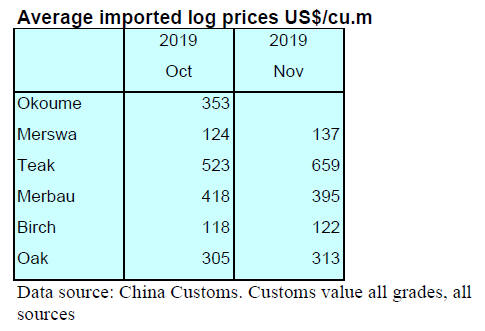US Dollar Exchange Rates of
25th January
2020
China Yuan 6.9367
Report from China
Rising disposable incomes despite uncertainties
In 2019 the per capita disposable income of Chinese
residents was RMB 30,733, an increase of 8.9% (nominal)
and 5.8% (real) compared to 2018. The per capita
disposable income of urban households increased 7.9%
and the per capita disposable income of rural households
increased over 9%.
See:
http://www.stats.gov.cn/english/PressRelease/202001/t20200119_1723719.html
Enterprises call for zero consumption tax on solid
wood flooring
Recently the Ministry of Finance and the State Taxation
Administration invited public comments on a draft
revision of the consumption tax. The new draft clarifies
that both companies and individuals are liable to pay a
consumption tax when they sell goods, process products or
purchase certain imported merchandise.
China started collecting a consumption tax on some
consumer goods in 1994.
In 2004, the country revised the consumption tax to adjust
the scope and rate of taxable items which added energyintensive,
highly polluting products and some high-end
consumer goods to the list.
In response to the recent call for comments the China
Timber and Wood Products Distribution Association
(CTWPDA) submitted a request for the elimination of the
tax on solid wood flooring as 90% of the raw materials for
wooden flooring manufacture are imported.
At the end of 2018 there were about 2,000 enterprises
making solid wood flooring and most of them are small
and micro private enterprises. According to a survey, 30%
of wooden flooring enterprises are close to ceasing
operations, 40% are struggling to maintain their business
and 30% are moderately profitable.
The consumption tax has increased the operating costs for
enterprises. The private sector argues this is not in line
with national policy on tax reduction and activation of
private enterprise development as it will undermine the
growth in consumption.
Wooden furniture exports through Huangpu
According to Huangpu Customs local enterprises exported
US$1.849 bil. of wooden furniture in the first eleven
months of 2019 through Huangpu Customs.
Dongguan city serves as a manufacturing base for wooden
furniture and more than 160 new companies have been
registered in 2020. There are more than 600 exportoriented
bamboo and wood products manufacturing
companies in the city.
Huangpu Customs has a sophisticated multi-link
integrated system to support Dongguan furniture exporters
compete in the global market.
The export of bamboo and straw products are traditional in
Huangpu these products are shipped to over 120 countries
and regions around the world. The main products are
cabinets, sofas, tables and chairs, wood brushes, wood
crafts, rattan and straw products. The export value of
wooden furniture accounts for 90% of total exports of
bamboo, wood and straw products.
The business environment in the Dongguan area is said to
be good with a comprehensive industrial chain creating the
environment convenient, fast and efficient trade.
First bonded timber warehouse
It has been reported that a private sector bonded
warehouse has become operational and is being managed
by Changzheng Bonded Logistics Co. Ltd. Dongyang
wood processing enterprises in Dongyang import from
around the world and managing stocks can be a problem.
The new bonded warehouse offers and alternative source
of raw material if the supply of imports is disrupted or
insufficient to meet production requirements.
New imported price data series
In an effort to provide more transparency on imported
timber prices in China a new data set is provided below
showing average prices for some key timbers imported.
It should be noted that these average prices are derived
from the import volumes and values as reported by
China¡¯s Customs.


|